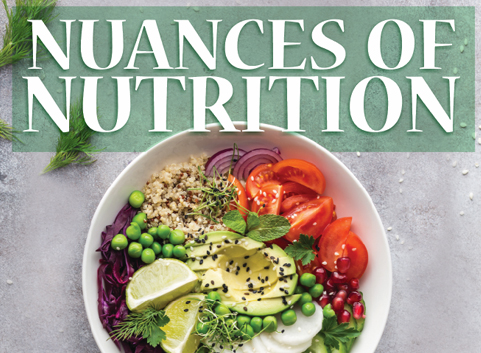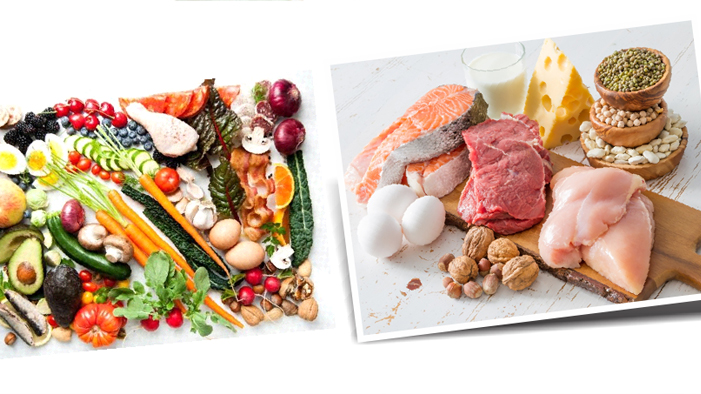Home Diet & Nutrition nuances of nutrition
Nuances Of Nutrition

By Yug Verma
THE LEGENDARY LOVE TRIANGLE:
Health, Fitness and Food- the 3 vertices of this love triangle. We are a generation that love to pursue good health and fitness.
8941699917

But we are also the generation who have been exposed to some of the tastiest delicacies in the past century. Our love for food is ever growing and yet we have managed to strike a balance between food, health and fitness. Or have we? What goes on our plate very strongly dictates the state of our health. Our fitness goals need to be supplemented with the right type of food choices. We also wouldn't want to give out on the brownies, cupcakes and pizzas (I mention these as they are my personal favorites) we so dearly love.
But there is a bigger puzzle that needs attention if sustainability is the goal. If you eat for your fitness goals you might miss out on health. If you focus on just health, you might not have adequate fueling for the fitness aspects. And well, if you solely eat for taste, that's a big problem in itself. So how do you find the balance between the three? Like I've said in my previous article, there shouldn't be a mutual exclusivity between the three.
What is Nutrition and Dieting ?
For me nutrition simply refers to nourishing the body with everything it needs for optimum health. It must take care of your vitals, internal systems, blood serum levels, energy needs, building and repair, etc. Dieting, on the other hand, refers to the certain structure/pattern you follow to get the required nutrition in. This is where I focus on having enough fuel for my fitness oriented goals. I've heard a lot of people refer to dieting as a bad thing and saying that you must focus on nutrition. Well, in my opinion all diets must be under the bigger umbrella of nutrition. Diets simply provide a timely order to how the nutrients will get into your system. When I use the word "diet", it undoubtedly implies that i'm getting all my nutrition (macro-nutrients and micro-nutrients). If your diet does not provide adequate nutrition, then you need to be reconsider your approach to dieting . Think of nutrition as a super market and diets are the layout in which products are displayed. Every supermarket might have a different layout, but you will most certainly find all products to be the same in all supermarkets.
"Diets and meal plans are situational, Nutrition is eternal."
The need for a certain diet/meal plan is very individualistic. It depends on your body's current state, your goals, your traditions and the type of "science" you're aiming to explore. Irrespective of what approach you follow (linear dieting, IIFYM, keto, reverse loading, carb-cycling, intermittent fasting and the list just goes on and on) your focus should be on understanding the things that work best for your body and ascertaining you get ample nutrition. I will walk you through some ideas that are a result of my personal experience and learning. Just as before, i will present a model of progression. This will help you map your way through the complex array of nutrition protocols being preached.
LEVEL 1 -
Healthy Eating
NO, this does not refer to eating "home cooked" food. If you've embarked on your fitness journey, you're damn well expected to know that the whole concept of "home cooked" food does not work. This is the level where you realize that the TYPES of food items you choose to eat have a tremendous impact on your goals. To give you some perspective, while on this level, you will start talking about food items like brown rice, oatmeal, egg-whites, chicken breasts, whey protein, salads, broccoli, peanut butter, almonds, fruits, etc. This is not an exhaustive list, with changing times, the options you can add to the list are endless. Also, you will some what start estimating your daily protein intake. That would probably be the only macro nutrient you try to count at this level. The concept of 'Meal Frequency' will sink in, and you will space out meals at 3 hour intervals.
By adding these food items and eating as per the meal plan, you will definitely see some minor changes in body composition. The removal of calorically dense foods and the addition of voluminous/satiating foods paired with the meal frequency will account for increased metabolism and quality nutrient uptake. Hence, the initial results. But very soon the progress will stall.
LEVEL 2- Scientific Eating
At this level, the importance of rationing/quantity of food becomes very clear. Most of you will start calculating your macro nutrient needs (assuming you've bought a kitchen scale by this time) for the day. You will find yourself engrossed in things like daily basal energy expenditure, exercise output and thermic effect of food. I call this 'Scientific Eating' because the origin of this has its roots in traditional thermodynamics. The whole idea revolves around NET ENERGY BALANCE- calories in vs calories out. Depending on your goals ( gaining weight or losing weight) you have to be in a surplus or deficit of calories. As long as you're maintaining a proper energy balance, you will achieve you goal, right? The answer to that is very grey in nature. Eating as per your caloric requirements will help you gain muscle and lose body fat. But there is a major flaw in this; your results will be far less than OPTIMUM. At least for the vast majority of people.
At this point, you've opened the doors to various forms of nutrition protocols- Macro tracking, IIFYM, intermittent fasting, keto, etc. All that works well now that you understand calorie balance. Also, I won't bother discussing why you shouldn't be eating all the fancy treats on a frequent basis simply cause "it fits your macros". Their called treats for a reason, they must be occasional.
The real problem lies with the so called "healthy" foods that people eat in different (and often wrong) combinations to suite their calorie needs. I'm referring to the kind of breakfast where you have some old fashioned oatmeal with a dash of whey protein and a drizzle of nuts along with a side serving of fruit. Can't get healthier than this right? This is just one of the many popular combinations that people usually indulge in. Yes, they meet your energy (calorie) goals, yes they seem pretty damn healthy and fit your macros. That does not necessarily lead to maximizing muscle gain and fat loss. If your goal is basic fat loss or muscle gain, the Level 2 approach might work for you (provided you don't mess up). Or if you get it wrong, you might just be stuck in a delusional cycle of gaining and losing "weight" without really making any real changes to your body composition. There is much more to optimally changing body composition than just net energy balance.

LEVEL 3 - Distilled Eating
Building quality muscle or reducing your body fat levels to the best potential takes more than just managing macros. I'll take the liberty of saying that I coined this phrase 'Distilled Eating'. I call it so because it is a highly refined level of nutrition where you take into account the timing, density, quality, and combination of nutrients you decide to put on your plate. By this time pretty much all of you are thinking "Ahh well. Here he goes, he'll start harping about eating steamed broccoli and boiled chicken for the rest of our lives". Before we move ahead, I'll clear out one thing. The term "distilled" in no way refers to a monotonous and dull way of eating. It focuses solely on distilling the nutrient quality as opposed to the taste and variety of foods.
So why the distilled way of eating? Changing body composition efficiently (and keeping it at the newly formed state) has a physiological, psychological and neurological aspect to it. 'Calories in vs Calories out' is just one part of the equation (and a crucial one too). But what often gets neglected is the ratio of Muscle Protein Synthesis (MPS) vs Muscle Protein Breakdown (MPB). If the scale doesn't tip towards MPS, recovery will suffer and you will definitely not build muscle. This can be countered with timing nutrients well, especially around your workouts. Another aspect is the hormonal response of nutrients. Various hormones and neurotransmitters are released in response to specific food items and can severely impact body composition in a good or bad way. Systemic inflammation of the body is another major concern which goes unattended. To have a positive hormonal response and reduced inflammation, the quality and density of nutrients should be taken into account before consumption.
Now coming to the most neglected and underrated part of the equation- nutrient combinations. Every human body is unique and its ability to handle nutrients differs from person to person. I've seen people stay stagnant with their progress year after year despite them following accurate periods of surplus and deficit diets. How many times have you heard some one say "Oh, no matter how much i eat, i don't put on body fat!" "No matter how well I diet, my body fat just wont budge below a certain level." "my muscle gain has stalled despite being in a surplus." What your body does with the food (muscle gain vs fat gain, muscle loss vs fat loss) is determined by your genetic code. Lets consider two fairly muscular twins starting their bulk at same body weight and 10% body fat. Both these guys have the exact same workout routines, they train with same intensiveness and they follow the same diet plan with the exact same food combinations. Both of them should build muscle and put on body fat at the same rate, right? Perhaps in a Utopian world. In reality, one of them will start putting on more body fat than the other; and that too at a much faster rate.
There is a big reason for this type of disparity when it comes to fat gain. If your meals are comprised of two primary fuel sources (carbs and fat) along with the protein source, it messes with your metabolic pathways. Neither of the sources are utilized appropriately. Your glucose uptake from the blood stream into the muscle is hindered and you end up storing most of the nutrients as body fat. This will also hinder the process of MPS and you develop lesser lean muscle than you ideally deserve. Some of you can get away with combining any nutrients on your plate and still torch fat or build muscle, but for the majority of us it's a tough task. Does this mean that the people limited by their genetic code can't ensure shuttling of nutrients to the right place ? To counter this, the right combinations are a must. As a simple rule, consider the following combinations-
1. Protein + Carbohydrates (Yes)
2. Protein + Fats (Yes)
3. Protein + Carbohydrates + Fats (No)
4. Carbohydrates + Fats (Absolutely No)
While doing these pairings, only the primary energy source/macro-nutrient needs to be considered. You don't have to be worried about the small quantities of fat that come along with the carbohydrate source and vice-versa. This will enhance your body's ability to shuttle nutrients more to the muscle and reduce the lipolytic (fat storing) effect significantly. Glucose disposal rate from the blood stream will be enhanced. When bulking, you will certainly limit fat gain. Even while in a deficit, you will retain muscle and torch body fat more efficiently. Keep your macro nutrient combinations simple and watch yourself break past plateaus. This is the level where fine tuning your diet strategies makes all the difference. Once you've moved past the phase of basic progress, clinical changes like these will go a long way in ensuring maximum results.
Be a FERRARI Eating for good health and fitness takes considerable effort. It is also a moderately expensive affair (funny how natural, unprocessed food is sold costlier than processed, refined food). When you put in the effort, it's not really fair that you don't reap 100% benefits that can come of it. For that, you have to evolve your nutrition protocol and take a superior approach.
Think of it this way; both the Le Ferrari and Hyundai i-20 are cars. Both help you get from one place to another. But when the need for performance arises, there is no comparison. The Le Ferrari has the looks and the performance which are almost out worldly. But you can't expect it to run on the cheap fuel that the Hyundai uses. It needs a heavily refined high octane fuel to reach its true potential. Same is the case with your body. For fueling it optimally, you need to put in superior nutrients. And to peak performance, you must focus on the timing, density, quality, and combination of nutrients. I have personally gone through all levels mentioned above. I only wish i could've stumbled across Level 3 much sooner.
"Don't let your efforts go unrewarded. Chase optimum performance. Unlock your best self. Be a Ferrari!"